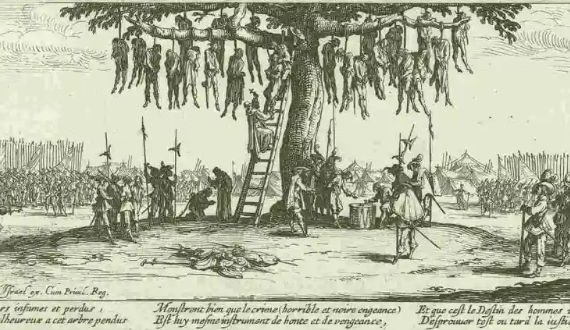Did the Little Ice Age cause the “General Crisis”?

The Black Death of the 1300s would have been an undeniably sucky time to live, the year 563 CE was pretty dire, and the first half of the 20th century saw more than its fair share of misery.
However, when looking at terrible times to be a human, the dreadfulness of the 17th century is often underappreciated. Wealth blossomed for some and the world became increasingly connected, but it was simultaneously riddled with war, political upheaval, inflation, and climate change chaos. Sound familiar?
Historians often call this period “The General Crisis”, an era defined by widespread conflict and instability that unfolded from the early 17th century until the early 18th century, most notably in Europe but also in significant parts of Asia.
As a sign of how tough things were around this century, it’s believed to be the last time the global human population dropped. The main driver of this decline was the ungodly number of wars that took place in the 1600s: the English Civil War, the Fronde civil wars in France, the Eighty Years’ War, the Franco-Spanish War, the First Anglo-Dutch War, the Mughal-Maratha Wars in India, and the collapse of the Ming dynasty in China to name just a few.
The cherry on top was the Thirty Years’ War (1618-1648), one of the most destructive wars in European history that was responsible for up to 8
Like any historical event, it can’t be simply explained by a single factor, and scholars have debated the source of the crisis for decades. However, it is clear that much of the turmoil can be linked back to the Little Ice Age that occurred around this time.
According to NASA, this freakishly cold period lasted from about 1550 CE to 1850 CE in Europe, North America, and Asia, with the first peak occurring right in the middle of the 17th century. The cause of the Little Ice Age is not known for certain, but one of the most trusted explanations says increased volcanic activity around this era played a prominent role.
Just to make this century of bloodshed even more unpleasant, the weather was awful. If you take a look at European paintings from this century, you’ll notice that many of them feature snowcapped landscapes. This is likely not a coincidence – temperatures in many parts of Western Europe cooled by 2°C.
From 1608 onwards, it was so cold in London that “Frost Fairs” were held on the Thames where locals would build markets, play games, and party on top of the frozen-over river. By the 19th century, great freezes of the Rivers Thames started to become less frequent, and now they scarcely occur.
It wasn’t all snowballs and festivals, however.
A 2011 study argued that the Little Ice Age had a drastic impact on agricultural production. In turn, this led to food shortages, economic turmoil, angry populations across Europe – and ultimately, a hell of a lot of wars, rebellions, and revolts.
By comparing climate data with other variables – including population sizes, wars, social disturbances, agricultural production, grain prices, and wages – the researchers concluded that the General Crisis was causally linked to global cooling between 1560 and 1660.
It’s clear that people in the 17th century were well aware of how grim their era was. A 1641 document from China reportedly reads: “Among all the strange occurrences of disaster and rebellion, there had never been anything worse than this.” Two years later, a pamphlet from Spain explained: “This seems to be one of the epochs in which every nation is turned upside down, leading some great minds to suspect that we are approaching the end of the world.”
It’s often said that we too are living in the end times: the climate crisis is deepening, dreadful diseases are wreaking havoc, pollution is rife, and geopolitical tensions are red hot. Perhaps when contemplating our own doom, we should look back to the 17th century to remember that all crises do eventually pass (and fresh crises will inevitably emerge).
By Tom Hale Senior Journalist
 Home Of Ghana News Ghana News, Entertainment And More
Home Of Ghana News Ghana News, Entertainment And More





